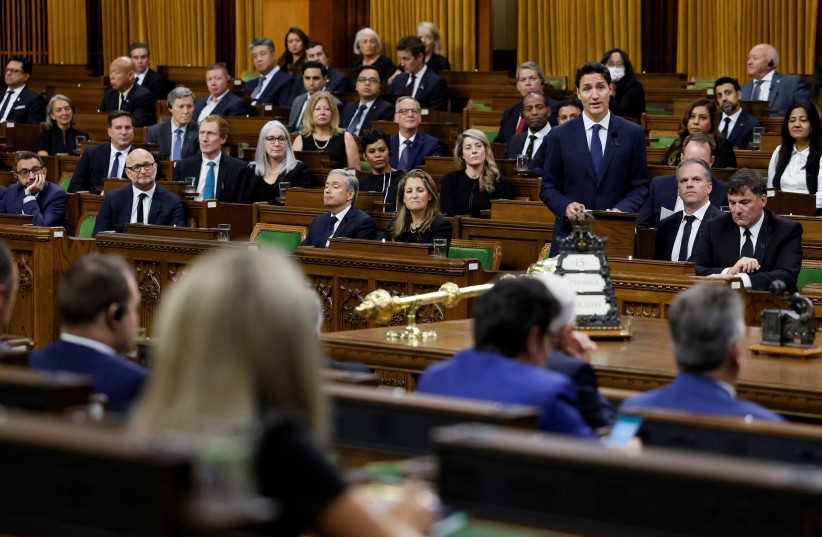There are many important differences between Israel and Canada. Canucks are currently freezing in their parkas and toques, while Israelis are still in shorts and sandals. Canadians play hockey, while Israelis prefer matkot. Canada has a separation of powers enshrined in a constitution that was adopted through public consultation, while Israel has an all-powerful Supreme Court that serves as an alternative legislature and executive. This lack of checks on the Supreme Court’s powers lies at the root of the cause for judicial reform.
The Jerusalem Post editorial board recently argued that Canada’s override clause is an inappropriate example for Israel, as the latter, unlike Canada, has no constitution. Canada’s override clause was passed to give the provinces, a minority entity, protection from federal power. Meanwhile, in Israel, the Supreme Court stands as the only check against government tyranny. In truth, it is precisely Israel’s lack of constitution that necessitates the override clause. The Supreme Court’s overreach is felt in all fields of Israeli politics, from security, to immigration, foreign affairs, and religion.
Democracies have a host of mechanisms that check all branches of government – legislature, executive and judiciary. Limitations on the court include clear definition of authorities, political control over the appointment of judges and legal advisers, and a doctrine of judicial restraint. The Knesset is in fact already restrained, while the Supreme Court is without institutional checks.
As a generalization, there are two types of democratic systems. In parliamentary systems such as the UK or New Zealand, parliamentary legislation is exempt from judicial review. In constitutional democracies, such as the US, Canada or Germany, the constitution is the supreme law of the land and offending laws can be struck down. Israel belongs to the family of parliamentary democracies. The override clause therefore, is a compromise between repealing judicial review and adopting a constitutional model.
Consider the difference in the constitutional processes between Canada and Israel. Before the adoption of the Canadian Charter of Rights and Freedoms in 1982, legislation could not be struck down. The move from a parliamentary to a constitutional system was a long process that required public consent.

In 1980, then-prime minister Pierre-Elliott Trudeau began the extensive course of drafting a constitution. Trudeau twice convened the premiers of provinces to work out an arrangement. The Parliament held a public consultation and heard close to 1,500 written and oral submissions. Finally, in 1982, the charter was passed with broad public support. The Supreme Court began shortly after reviewing legislation based on charter rights.
No real constitution in Israel
CONTRAST THIS with the supposed basis for constitutional review in Israel. Israel’s “constitution” was created by its Supreme Court. The Human Dignity and Liberty Basic Law was passed in 1992 by a minority of Knesset members and was preceded by very little public discussion or involvement. When the Basic Law was passed, chief justice Aharon Barak declared in the famous 1995 Mizrahi Decision that a “constitutional revolution” had occurred and that the Court could now strike down laws. One would be hard pressed to find another constitution whose birth was announced by the court.
Canada has many checks on its Supreme Court, which do not exist in Israel. In Canada, federal judges are appointed by the prime minister, in keeping with the overwhelming majority of democratic countries. In Israel, politicians are a minority of the selection committee, essentially giving the judges a veto over Supreme Court candidates.
In Canada, the attorney-general is a member of parliament and serves in parallel as the justice minister. He, and his civil servant deputy, serve at the pleasure of the prime minister, who can replace or fire them at will. Their powers are defined in the Constitution. By contrast, Israel’s attorney-general is appointed by a professional committee.
Several Supreme Court justices have ruled that his opinion is binding on the government, and he is the government’s exclusive representative before the courts. The courts and the legal advisers thus work in tandem to curtail government policies. Of course, these extremely significant powers are nowhere defined in law.
Finally, the Canadian Supreme Court accepts in principle that there are issues that are inappropriate for the courts to get involved in, namely issues of social, economic, and foreign policy. In Israel, “everything is justiciable.”
Israel is not Canada. Canada has a constitution and balances its court through political control of judicial and adviser appointments and has a legal culture of restraint. In Israel, the Supreme Court is the architect and arbitrator of the constitution. There are practically no institutional checks on the Supreme Court.
The override clause is therefore a compromise between the British model of parliamentary supremacy and the constitutional model. The court will continue to review legislation, yet the Knesset will have the final word in exceptional circumstances. This will strengthen, not hurt, Israeli democracy.
The writer is a lawyer, and a researcher in the Legal Department of the Kohelet Policy Forum.
